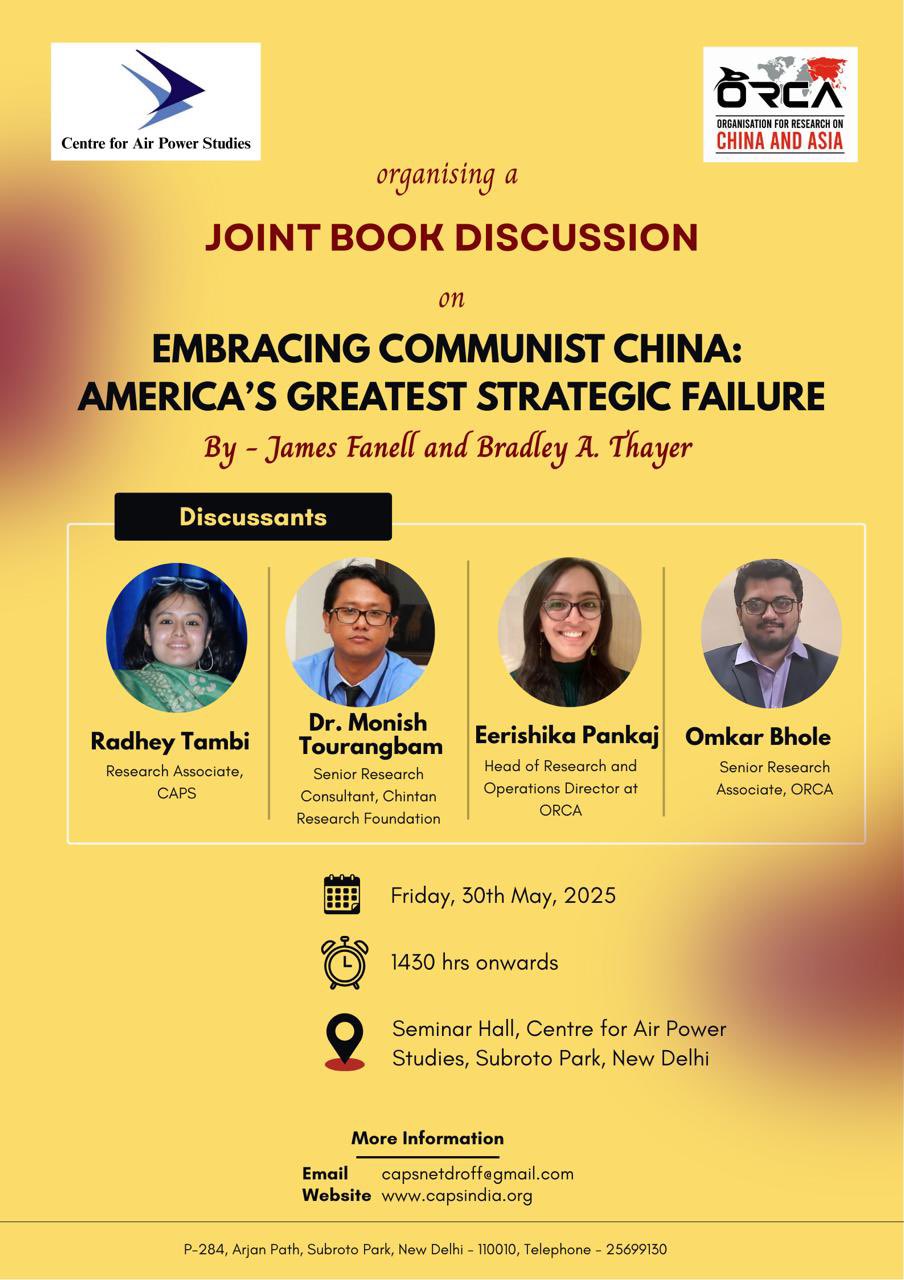The Organisation for Research on China and Asia (ORCA) and the Centre for Air Power Studies (CAPS) co-hosted a Joint Book Discussion on "Embracing Communist China: America's Greatest Strategic Failure", co-authored by James Fanell and Bradley A. Thayer. The discussion took place on 30th May 2025 from 2:30 PM onwards at the Seminar Hall, Centre for Air Power Studies, Subroto Park, New Delhi.
Ms. Radhey Tambi, Research Associate, Centre for Air Power Studies opened the discussion with an overview of the book, outlining its structure and central arguments. The book explores the rationale behind the U.S. engagement with China and the strategic consequences that followed. It revisits Francis Fukuyama’s notion of “The End of History” to illustrate how an overconfidence in liberal democratic ideals led the U.S. to underestimate China’s long-term rise. Ms. Tambi critiqued the book for not treating the issue with sufficient urgency, particularly in areas such as corporate engagement, academia, and the military. She observed that the book offers few concrete recommendations and lacks depth in its analysis of systemic challenges. She also emphasized the economic interdependence between nations, suggesting that disengaging from China is far more complex than the book implies. She noted the book’s limited attention to India, despite its potential role in balancing the U.S.-China rivalry. She concluded by advocating for greater strategic focus on India’s position in this geopolitical dynamic and called for a deeper understanding of Chinese communism in shaping policy responses.
Ms. Eerishika Pankaj, Head of Research and Operations Director, Organisation for Research on China and Asia, argued that the book lacks a diversity of perspectives, particularly those grounded in Chinese political and ideological contexts. She pointed out that while the authors are well-versed in the U.S. foreign policy, their expertise in Chinese studies appears limited. As a result, the book focuses heavily on criticizing U.S. actions in the region, while offering little insight into the internal dynamics of the Chinese Communist Party (CCP). Eershika highlighted the book’s assertion that the CCP's rule is "illegitimate" as overly reductive. She emphasized that a significant portion of China's population expresses trust in the CCP, and failing to acknowledge this reality risks oversimplifying China’s complex political landscape. She also mentioned the concept of “threat deflation,” which describes how U.S. elites historically underestimated China’s long-term strategic challenge. According to the book, this decline in perceived threat, especially after the Cold War, was not accidental but rather the outcome of deliberate Chinese efforts to shape U.S. perceptions. Under Deng Xiaoping’s leadership, China expanded its soft power by establishing Confucius Institutes abroad and forging ties with U.S. think tanks, corporations, and lobbyists.
Mr. Omkar Bhole, Senior Research Associate, Organisation for Research on China and Asia, opened his remarks by highlighting the rising U.S.-China tensions and the book’s central argument: that China poses the most significant strategic and ideological threat to the U.S. in recent history. This perception has driven a shift in American policy, including tighter controls on Chinese students in sensitive fields and efforts to curb China’s access to emerging technologies. Mr. Bhole emphasized that while the book’s tone may be debated, its influence is clear. It frames China’s rise as a zero-sum competition and details how Beijing uses media and tech-based influence operations to mask its intentions, what the authors call “threat definition.” He traced this deceptive strategy back to the post-Cold War period, noting parallels with India’s own experiences of Chinese aggression despite diplomatic engagement. He agreed with the authors that the ways China influences top leaders, leads people to think certain ways about its military and portrays its ascent as peaceful has been effective worldwide. He suggested that, like the U.S., India needs to study China in detail and educate people on what China hopes to achieve economically and politically.
Dr. Monish Tourangbam, Senior Research Consultant, Chintan Research Foundation, critiqued the book binary framing of global politics, where China is cast entirely in a negative light and the U.S. in an uncritically positive one. He acknowledged the book’s provocative insights into U.S. foreign policy but challenged its deterministic tone. Rather than being guided by a coherent grand strategy, he argued, foreign policy often unfolds through uncertainty, personal decision-making, and unintended consequences. He posed two critical questions: When does a rising power truly “rise”? And what constitutes an existential threat—is it military might, economic leverage, cyber capabilities, or territorial maneuvers such as those involving Taiwan? These questions, he noted, lie at the core of contemporary U.S. strategic debates. Dr. Tourangbam concluded by observing that dominant powers often label emerging challengers as threats ideologically and materially merely for asserting their own national interests.
The report is prepared by ORCA's research interns, Yuvraj Sindhwani and Vidisha Jain.


